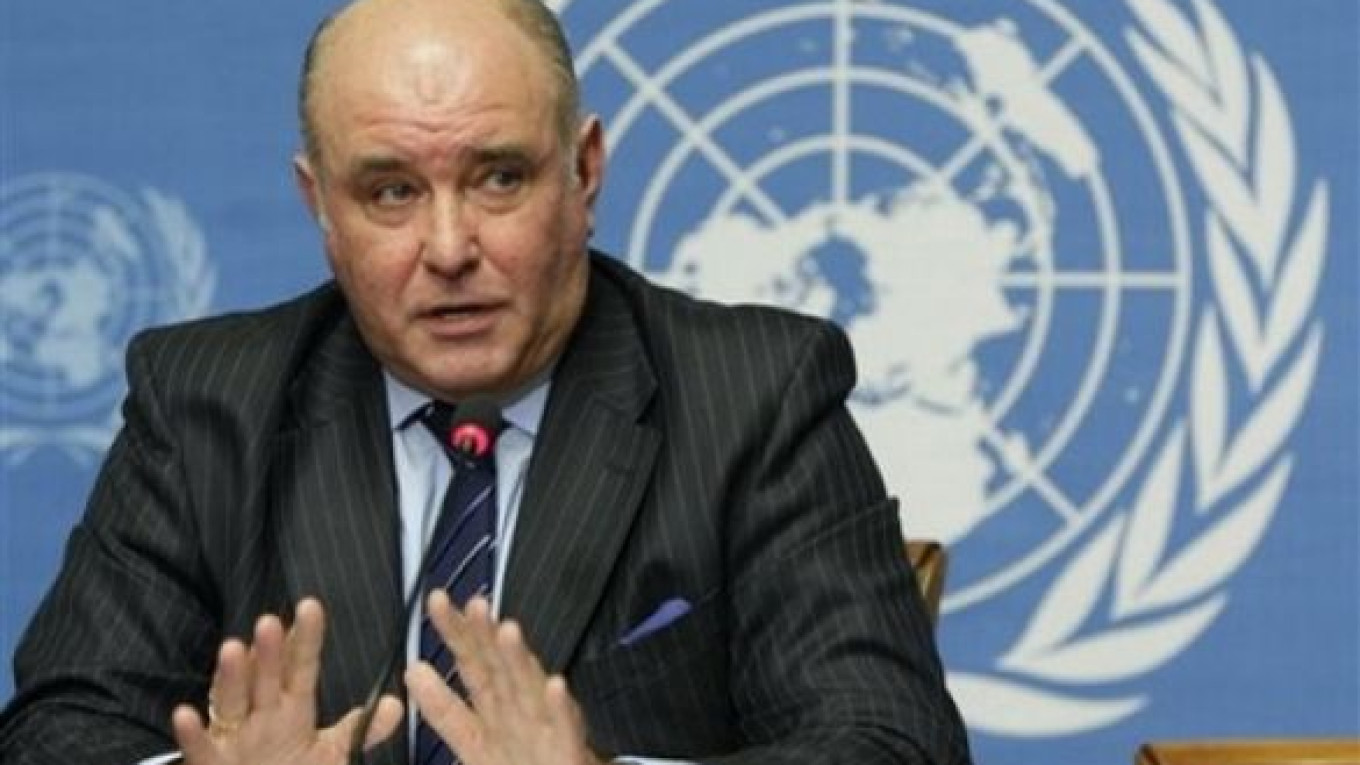Deputy Foreign Minister Grigory Karasin and Georgia’s special representative for relations with Russia met in Prague on Friday to discuss bilateral ties following a “significant improvement” recently, the Foreign Ministry said Saturday.
Karasin and Zurab Abashidze discussed trade, culture and transportation issues, while the statement, posted on ministry’s website, said Russia was considering easing its visa regime for Georgians.
Georgia confirmed that it would participate in the 2014 Winter Olympics in Sochi, while Russia pledged to provide its full support to the Georgian team during the games.
In 2010, Georgian President Mikheil Saakashvili called for his country to stay away from the Sochi Games in the wake of 2008 war with Russia over South Ossetia and Abkhazia. In November 2012, Georgia’s new government and Prime Minister Bidzina Ivanishvili announced that the country would send its team to the Olympics.
Sochi’s Olympic Park is only three kilometers from the border with Abkhazia, which was recognized by Russia, Nicaragua and Venezuela as an independent country but is still considered a breakaway region of Georgia by most United Nations member states.
The Foreign Ministry’s statement said the issues of Abkhazia and South Ossetia were not discussed at the meeting.
Paata Zakareishvili, Georgia’s minister for reintegration, told The Moscow Times that Russia could no longer act as a mediator in the conflict because relations between Georgia and Abkhazia and South Ossetia could be negotiated only on “a bilateral level.”
As of now, he said, there are no contacts between Georgia and the two breakaway territories apart from the Geneva talks on security in the Caucasus. Those talks have been held since the war with representatives of Abkhazia, South Ossetia, Russia and the United States to ensure peaceful settlement of conflicts.
“Georgia’s policy has undergone a radical transformation recently, and we understand that people of Georgia and South Ossetia will need to adjust to it,” Zakareishvili added.
Following the October Georgian parliamentary election, Ivanishvili initiated a change of tone and policy in Georgian-Russian relations.
The new government also adopted softer rhetoric on issues connected with South Ossetia and Abkhazia.
Zakareishvili said that he believed that Russia now concentrates most of its effort on hosting the Sochi Olympics well and that Georgia can only help it in this endeavor. In his opinion, as soon as the games are over, Russia will have more liberty to make a constructive contribution to the region’s stability.
Irakly Khintba, deputy foreign minister of Abkhazia, said Zakareishvili is one of the most sensible Georgian officials with regard to Abkhazia. Nevertheless, he said Georgia still lacks a “cohesive set of policies on this matter.”
At the same time, he insisted that “the only way to build good relations between Abkhazia and Georgia is for the Georgian government to recognize Abkhazia’s independence.” Khintba said the state of relations between Russia and Georgia did not have any direct impact on the relations between Georgia and Abkhazia.
So far, the potential return of Georgia’s products to Russia after a 2006 ban, which was widely seen as politically motivated, has been the most significant sign that there has been a shift in relations between the two states.
On Friday, experts from Russia’s Federal Consumer Protection Service finished the first stage of their wine and mineral water inspection mission to Georgia. The new Georgian government hopes that this will lead to the resumption of imports of Georgian products to Russia.
As Saakashvili criticized the mission and accused it of being corrupt, consumer protection service head Gennady Onishchenko warned that Russia might consider calling it off. At the same time, he said he would visit Georgia after his agency’s experts come back.
The head of Georgia’s national wine agency told Interfax that the Russian experts’ visit was successful.
Earlier, the parties declared that the embargo could be lifted as early as this spring. Karasin and Abashidze concluded that the meeting was “constructive,” and they agreed to meet another time in late May or June.
Contact the author at [email protected]
Related articles:
A Message from The Moscow Times:
Dear readers,
We are facing unprecedented challenges. Russia's Prosecutor General's Office has designated The Moscow Times as an "undesirable" organization, criminalizing our work and putting our staff at risk of prosecution. This follows our earlier unjust labeling as a "foreign agent."
These actions are direct attempts to silence independent journalism in Russia. The authorities claim our work "discredits the decisions of the Russian leadership." We see things differently: we strive to provide accurate, unbiased reporting on Russia.
We, the journalists of The Moscow Times, refuse to be silenced. But to continue our work, we need your help.
Your support, no matter how small, makes a world of difference. If you can, please support us monthly starting from just $2. It's quick to set up, and every contribution makes a significant impact.
By supporting The Moscow Times, you're defending open, independent journalism in the face of repression. Thank you for standing with us.
Remind me later.


